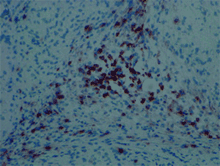Therapies using induced pluripotent stem cells could encounter immune rejection problems
By By Kim McDonald and Chris Palmer | 14 May 2011
Biologists at UC San Diego have discovered that an important class of stem cells known as ''induced pluripotent stem cells,'' or iPSCs, derived from an individual's own cells, could face immune rejection problems if they are used in future stem cell therapies.
 |
| An infiltration of T cells, shown by dark brown color, can be seen in the tissues formed by iPSCs. Credit: Yang Xu, UC San Diego |
In today's advance online issue of the journal Nature, the researchers report the first clear evidence of immune system rejection of cells derived from autologous iPSCs that can be differentiated into a wide variety of cell types.
Because iPSCs are not derived from embryonic tissue and are not subject to the federal restrictions that limit the use of embryonic stem cells, researchers regard them as a promising means to develop stem cell therapies. And because iPSCs are derived from an individual's own cells, many scientists had assumed that these stem cells would not be recognized by the immune system. As a consequence, the immune system would not try to mount an attack to purge them from the body.
In fact, scientists regarded iPSCs as particularly attractive candidates for clinical use because cells derived from embryonic stem cells will induce immune system rejection that requires physicians to administer immune suppressant medications that can compromise a person's overall health.
But the UCSD biologists, funded by NIH and an early translational grant from the California Institute for Regenerative Medicine, the state's stem-cell funding agency, found that iPSCs are subject to some of the same problems of immune system rejection as embryonic stem cells.
''The assumption that cells derived from iPSCs are totally immune tolerant has to be reevaluated before considering human trials,'' says Yang Xu, a professor of biology at UCSD who headed the team that published the study.



















